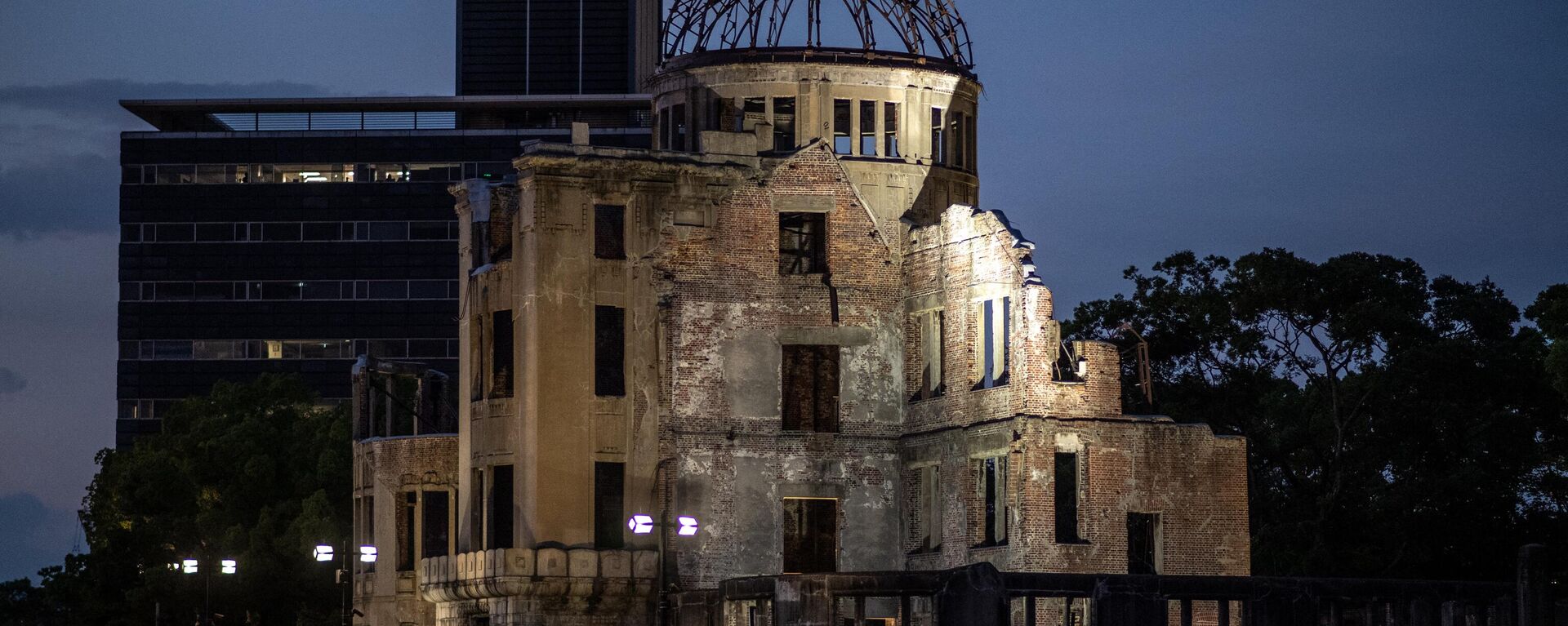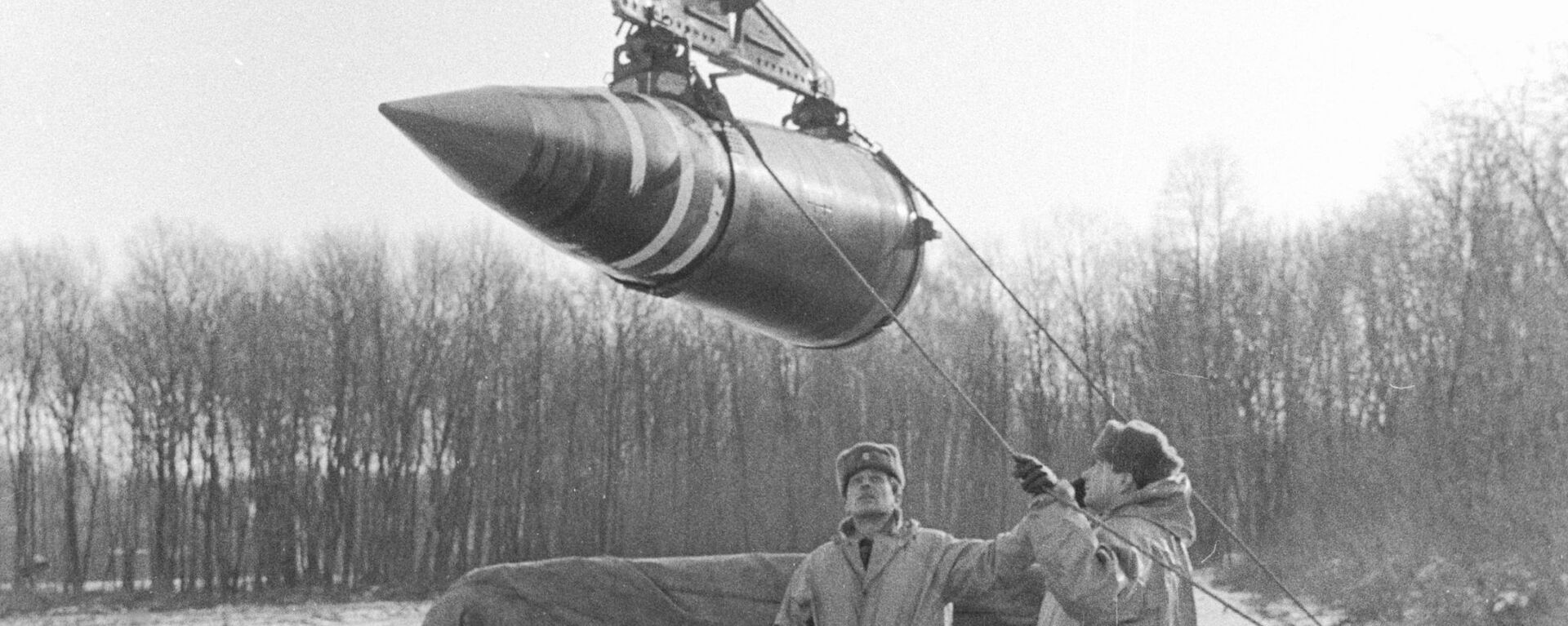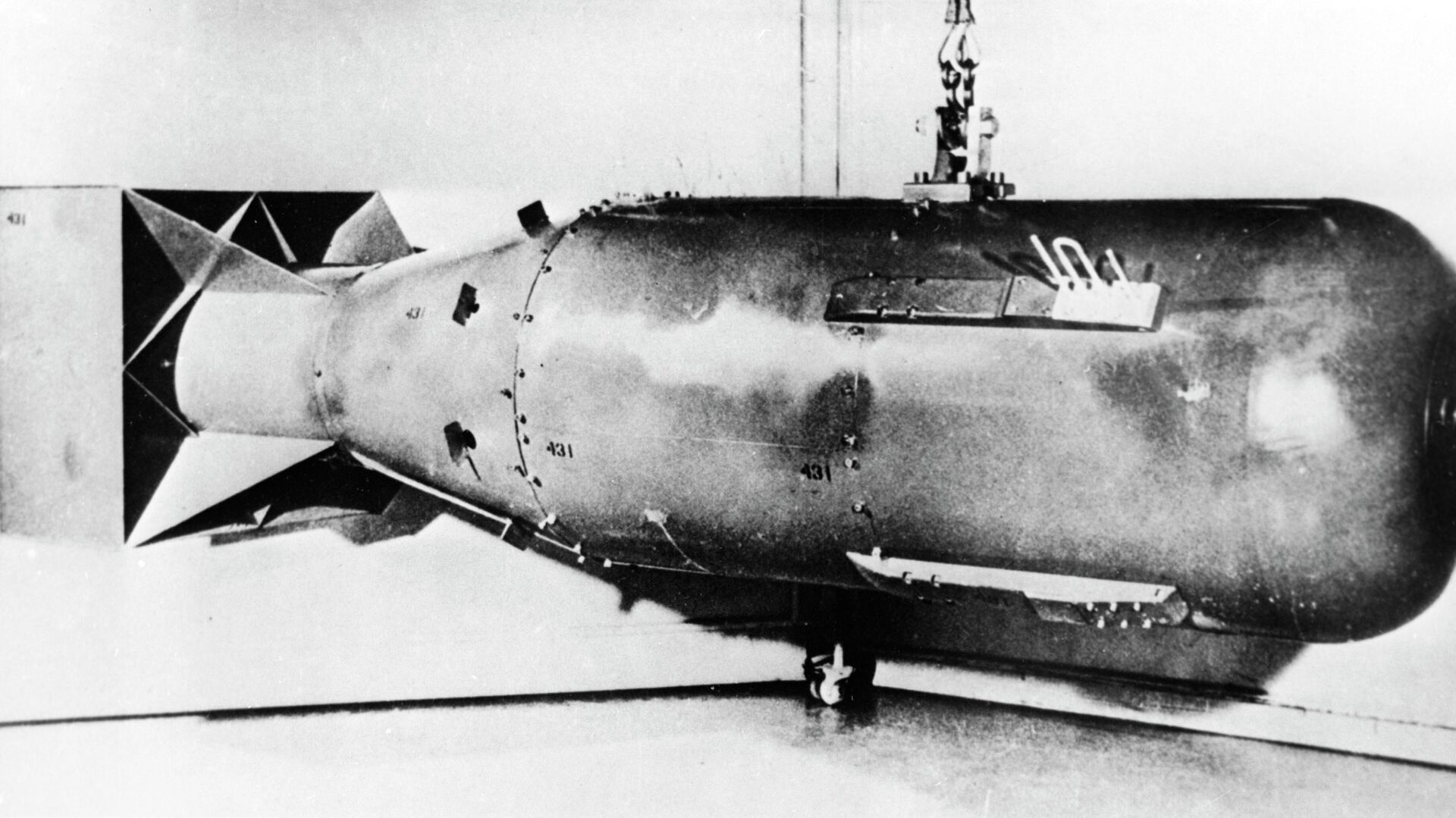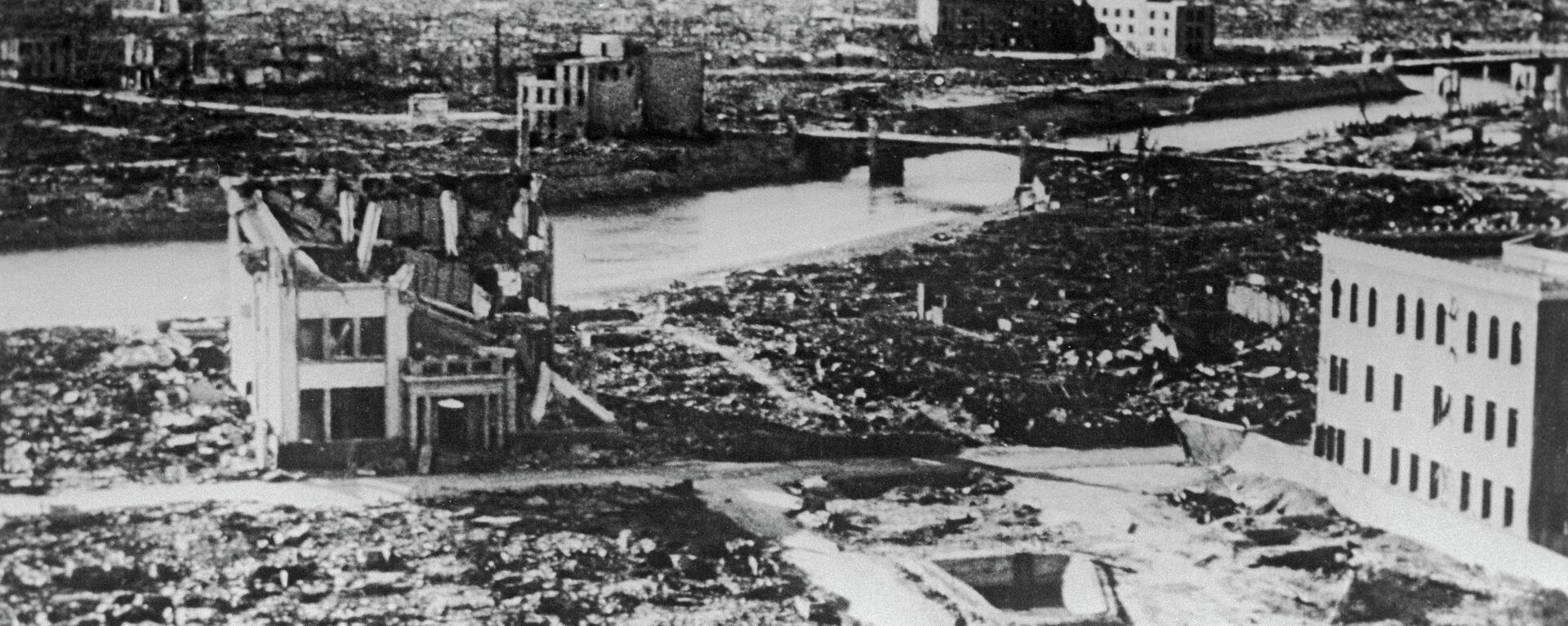https://sputnikglobe.com/20230806/us-narrative-that-wwii-won-thanks-to-atomic-bombs-makes-more-countries-want-to-acquire-nukes-1112418020.html
US Narrative That WWII Won Thanks to Atomic Bombs Makes More Countries Want to Acquire Nukes
US Narrative That WWII Won Thanks to Atomic Bombs Makes More Countries Want to Acquire Nukes
Sputnik International
The lessons of the US atomic bombings of the Japanese cities of Hiroshima and Nagasaki have been forgotten, while today's tense relations between nuclear powers make arms reductions unlikely, experts told Sputnik.
2023-08-06T08:37+0000
2023-08-06T08:37+0000
2023-08-06T08:37+0000
world
hiroshima
nagasaki
russia
us
nuclear bomb
nuclear bombing
https://cdn1.img.sputnikglobe.com/img/07e7/08/06/1112417833_37:0:3678:2048_1920x0_80_0_0_87a0b429017d9c965a02a6b29d2b11f1.jpg
August 6 marks the 78th anniversary of the world's first use of an atomic bomb. Two bombs were dropped on Japan by US warplanes in 1945, killing and maiming hundreds of thousands of people. The effects are still being felt today. The bombings showed the true power of nuclear weapons and stimulated the emergence of a de facto nuclear taboo — the avoidance of nuclear use — but the new flare-up of tensions between the United States and Russia has created the second most dangerous situation since the 1962 Cuban Missile Crisis, Nikolai Sokov of the Vienna Center for Disarmament and Nonproliferation told Sputnik. Sokov, whose expertise covers arms control and nuclear nonproliferation, warned that some countries and members of the expert community were so convinced there could never be a repeat of the World War II nuclear bombings that they unwittingly created situations in which nuclear use became possible. The United States and Russia are not yet ready to reduce their nuclear stockpiles, both for political reasons and because of discrepancies between their non-nuclear military arsenals. But even if cuts did take place, there would still be plenty of nuclear bombs left, the expert argued. "In contrast to the Cold War, the scenario of large-scale nuclear use is extremely unlikely: when we talk about nuclear use today, we talk about single digits. Even deep reduction of nuclear arsenals will not prevent such limited use — if the US and Russia go down to 1,000, for example, or even 500, there will still be plenty left for the most likely nuclear use scenarios," he predicted. As of January, there were 12,512 warheads in global military stockpiles, according to estimates by the Stockholm International Peace Research Institute (SIPRI). Of these, an estimated 9,576 warheads were said to be available for potential use, an increase of 86 from last year. The number of deployed US warheads grew to 1,770, while Russia’s was up to 1,588. China's nuclear arsenal increased to 410. "Thus, to the extent that the international community has learnt lessons from the bombing of Hiroshima and Nagasaki, those lessons have been mixed," he admitted. The nuclear devastation of Hiroshima and Nagasaki cannot prevent nuclear war, only the abolition of nuclear weapons can, M. V. Ramana warned. There is no hope of reducing the world's nuclear stockpiles in the near future, he said, because current international relations are too tense to open up possibilities for arms reductions. US pilots dropped atomic bombs on the Japanese cities of Hiroshima and Nagasaki on August 6 and 9, 1945, respectively. The bombings and their aftermath killed 140,000 people in Hiroshima and 74,000 in Nagasaki. The vast majority of the victims of the atomic bombings were civilians.
https://sputnikglobe.com/20220806/hiroshima-survivor-hopes-her-generation-last-to-suffer-through-such-a-cruel-experience-1098295156.html
https://sputnikglobe.com/20221222/japans-lawmaker-calls-on-us-to-recognize-atomic-bombings-of-hiroshima-nagasaki-a-mistake-1105685562.html
https://sputnikglobe.com/20230114/from-no-nukes-pledge-to-dirty-bombs-how-kiev-broke-its-promise-to-reject-nuclear-weapons-1106324715.html
hiroshima
nagasaki
russia
Sputnik International
feedback@sputniknews.com
+74956456601
MIA „Rossiya Segodnya“
2023
Sputnik International
feedback@sputniknews.com
+74956456601
MIA „Rossiya Segodnya“
News
en_EN
Sputnik International
feedback@sputniknews.com
+74956456601
MIA „Rossiya Segodnya“
Sputnik International
feedback@sputniknews.com
+74956456601
MIA „Rossiya Segodnya“
us bombing of hiroshima, us bombing of nagasaki, us atomic bomb, us nukes, nuclear weapons, nuclear threat
us bombing of hiroshima, us bombing of nagasaki, us atomic bomb, us nukes, nuclear weapons, nuclear threat
US Narrative That WWII Won Thanks to Atomic Bombs Makes More Countries Want to Acquire Nukes
MOSCOW (Sputnik) – The lessons of the US atomic bombings of the Japanese cities of Hiroshima and Nagasaki have been forgotten, while today's tense relations between nuclear powers make arms reductions unlikely, experts told Sputnik.
August 6 marks the 78th anniversary of the
world's first use of an atomic bomb. Two bombs were dropped on Japan by US warplanes in 1945, killing and maiming hundreds of thousands of people. The effects are still being felt today.
The bombings showed the true power of nuclear weapons and stimulated the emergence of a de facto nuclear taboo — the avoidance of nuclear use — but the new flare-up of tensions between
the United States and Russia has created the second most dangerous situation since the 1962 Cuban Missile Crisis, Nikolai Sokov of the Vienna Center for Disarmament and Nonproliferation told Sputnik.
"The lessons of Hiroshima and Nagasaki have been forgotten by some: everyone still remembers that the use of nuclear use was horrible, but the second lesson — do not create situations that increase the risk of nuclear use — is not shared by everyone," he said.
Sokov, whose expertise covers arms control and nuclear nonproliferation, warned that some countries and members of the expert community were so convinced there could never be a repeat of the World War II nuclear bombings that they unwittingly created situations in which nuclear use became possible.

22 December 2022, 05:00 GMT
The United States and Russia are not yet ready to reduce their nuclear stockpiles, both for political reasons and because of discrepancies between their non-nuclear military arsenals. But even if cuts did take place, there would still be plenty of nuclear bombs left, the expert argued.
"In contrast to the Cold War, the scenario of large-scale nuclear use is extremely unlikely: when we talk about nuclear use today, we talk about single digits. Even deep reduction of nuclear arsenals will not prevent such limited use — if the US and Russia go down to 1,000, for example, or even 500, there will still be plenty left for the most likely nuclear use scenarios," he predicted.
As of January, there were 12,512 warheads in global military stockpiles, according to estimates by the Stockholm International Peace Research Institute (SIPRI). Of these, an estimated 9,576 warheads were said to be available for potential use, an increase of 86 from last year. The number of deployed US warheads grew to 1,770, while Russia’s was up to 1,588. China's nuclear arsenal increased to 410.
M. V. Ramana, an expert on disarmament, global and human security at the School of Public Policy and Global Affairs in Vancouver, told Sputnik that the US narrative about how nuclear weapons helped end World War II made more countries want to acquire this weapon. This led to the suffering of communities affected by nuclear weapons production and testing, such as the French overseas territories in the South Pacific.
"Thus, to the extent that the international community has learnt lessons from the bombing of Hiroshima and Nagasaki, those lessons have been mixed," he admitted.

14 January 2023, 18:45 GMT
The nuclear devastation of Hiroshima and Nagasaki cannot prevent nuclear war, only the abolition of nuclear weapons can, M. V. Ramana warned. There is no hope of reducing the world's nuclear stockpiles in the near future, he said, because current international relations are too tense to open up possibilities for arms reductions.
US pilots dropped atomic bombs on the Japanese cities of Hiroshima and Nagasaki on August 6 and 9, 1945, respectively. The bombings and their aftermath killed 140,000 people in Hiroshima and 74,000 in Nagasaki. The vast majority of the victims of the atomic bombings were civilians.





